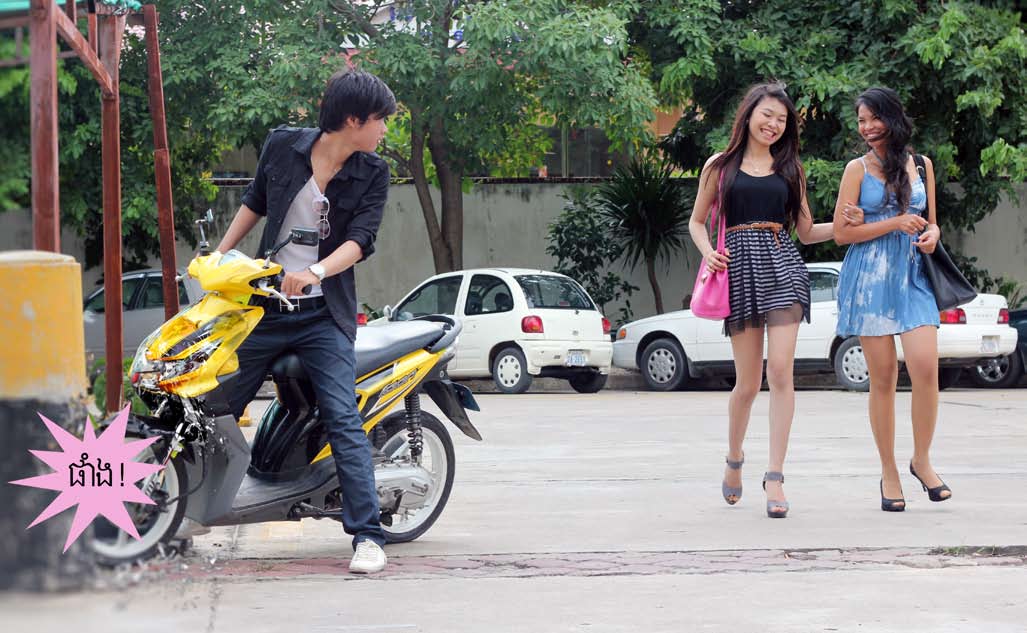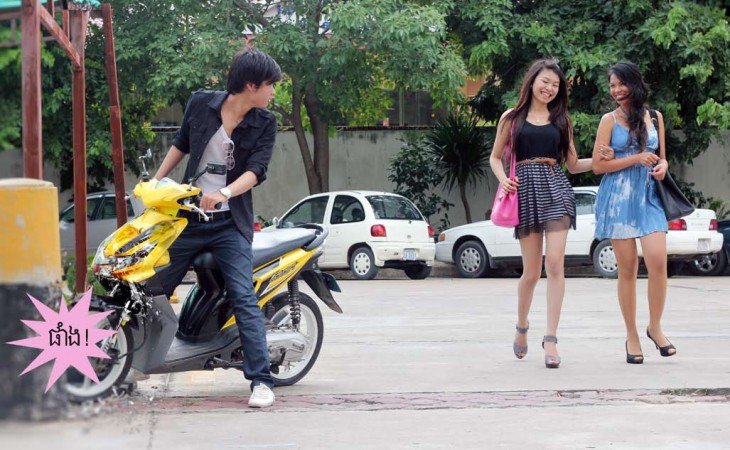I like to see them wearing short skirts, but I wouldn’t want my sister or my girlfriends to do it
 Clothing is used not only to stay warm and preserve privacy but can also be an expression of personal identity and national culture. For example, traditional Cambodian fashion choices helped define our culture of modesty: small shorts, short skirts, and revealing tops used not to be very common.
Clothing is used not only to stay warm and preserve privacy but can also be an expression of personal identity and national culture. For example, traditional Cambodian fashion choices helped define our culture of modesty: small shorts, short skirts, and revealing tops used not to be very common.
But changes have begun taking place in recent years, especially among urban dwellers who began sporting more Western clothing styles. Even more recently, Cambodians have adopted styles from Korea and Hong Kong.
It’s now common to see young Cambodians wearing revealing clothes almost anywhere. Take a drive around the city, and you will see teens, some younger than 18, wearing very short, revealing skirts as if they couldn’t care less.
Even when going to school, some students would rather wear stylish shorts and skirts than obey formal Khmer student dress codes. Wearing these types of clothes can be thrilling and attention-getting, but can have negative consequences as well.
Female students wearing short skirts can distract male students, and even teachers, from doing their job, thus lowering the quality of education.
In an interview with the German press agency DPA, an English literature student said he had noticed many of his female classmates were wearing short skirts.
“We always turn back to see them,” he said. “I like to see them wearing short skirts, but I wouldn’t want my sister or my girlfriends to do it”.
On March 29, 2010, the Phnom Penh Post reported on a rally of more than 100 people who came out to urge Khmer women to dress more modestly. San Arun, secretary of state for the Ministry of Women’s Affairs, told the Post that: “Wearing short skirts and sexy clothes causes rape to occur, because all men, when they see white skin, immediately feel like having sex.”
Other voices would strongly disagree. Sim Socheata sent a letter to the Phnom Penh Post’s editor saying: “We are witnessing that women and girls are being blamed for being raped and sexually harassed for the kind of places they decide to go, the kind of dresses they decide to wear and the length of those dresses.
“Instead of calling for women to stop wearing short skirts, the Khmer Teachers Association could have marched against male perpetrators who rape women and girls, men who commit violence in the famil and male teachers who sexually harass their students.”
Still, there are other problems. It may sound funny, but wearing sexy clothing can cause traffic accidents. If they have the power to distract students in class, it is also highly possible that miniskirtwearing women could distract the attention of drivers on the road.
Besides these effects on other people, female students may elicit poor opinions of themselves by wearing lascivious garments.
In Bill Thourlby’s You Are What You Wear – The Key to Business Success, the author claims that when you walk into a room, even if no one there knows you, they will make 10 assumptions about you based solely on your appearance.
They may make many others, but you can be assured they will form conclusions about your economic level, your educational background, your trustworthiness, your level of sophistication, your economic heritage, your social heritage, your educational heritage, your success and your moral character.
So, wearing clothing that fits properly with your situation is very important because, as they say, you don’t get a second chance to make a first impression.
For better or worse, people will determine who you are by the clothing and styles you choose. So if you’re a student, don’t dress like someone working in another career.
Media can be a powerful tool for promoting culture, but it can also be harmful because people, especially teenagers, will follow what they see projected in the media.
In 2000, Prime Minister Hun Sen banned pop stars in Cambodia from sporting short, sexy skirts when they appeared on television.
Quoted by Agence-France Presse (AFP), Hun Sen said: “These singers who like to wear sexy clothes look like they have not enough clothing. Don’t bring them on to TV, let them sing in nightclubs or restaurants. This is not Cambodian tradition, and we have our own rich traditions and culture.”
And even if lascivious performances have stopped on television, sexy photos of some stars still appear in local magazines.
Recently, Cambodians have become more active on the internet, including social networking sites such as Facebook. I’ve seen many teens upload sexy and scandalous pictures onto the internet.
To conclude, all I’d like to say is that only you can choose who you are going to be, and what you want others to think of you.
19/08/2011 By: Dara Saoyuth This article was published on LIFT, Issue 82 published on August 03, 2011Related articles
- Constructive Cambodian: Cambodian local investment (saoyuth.wordpress.com)
- Libraries a brilliant learning resource (saoyuth.wordpress.com)

Yeah, i agreed with your comment that teenagers fit every clothes well, but it’s sometimes not fit to the society well:)
Oh! It’s a nice idea that you have posted and also remind me many idea that I never thought before. Really thanks. Brother Saoyuth.